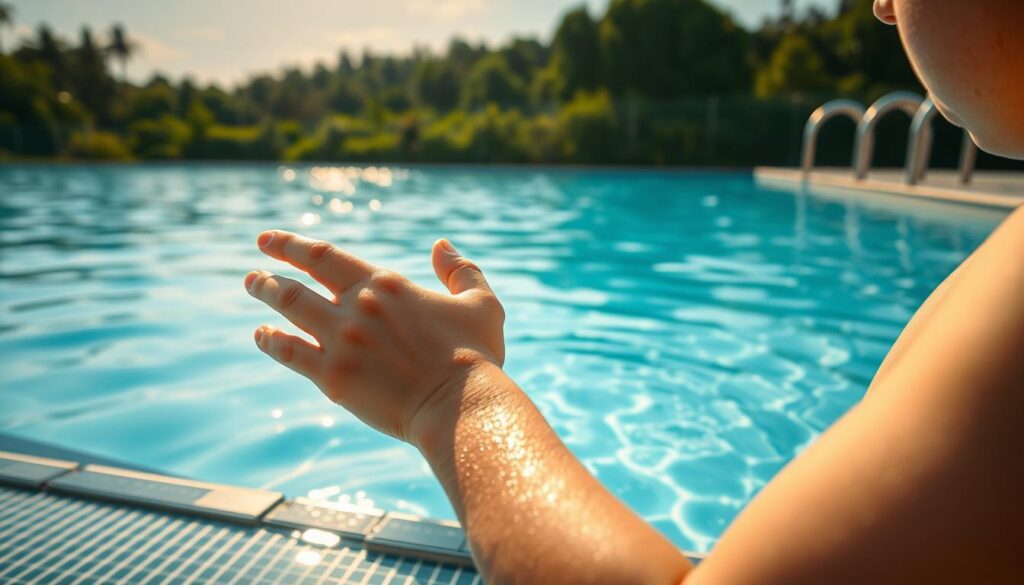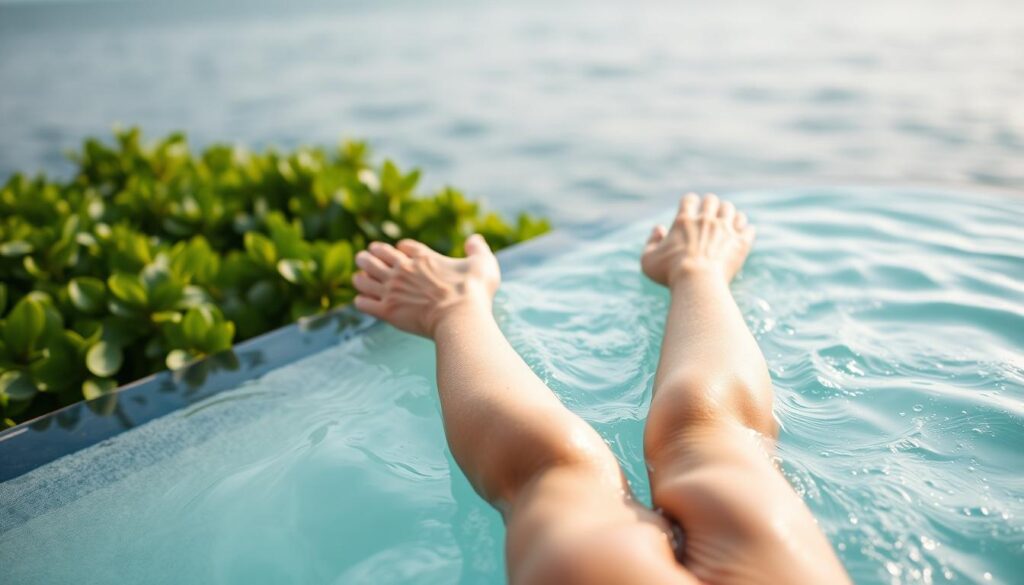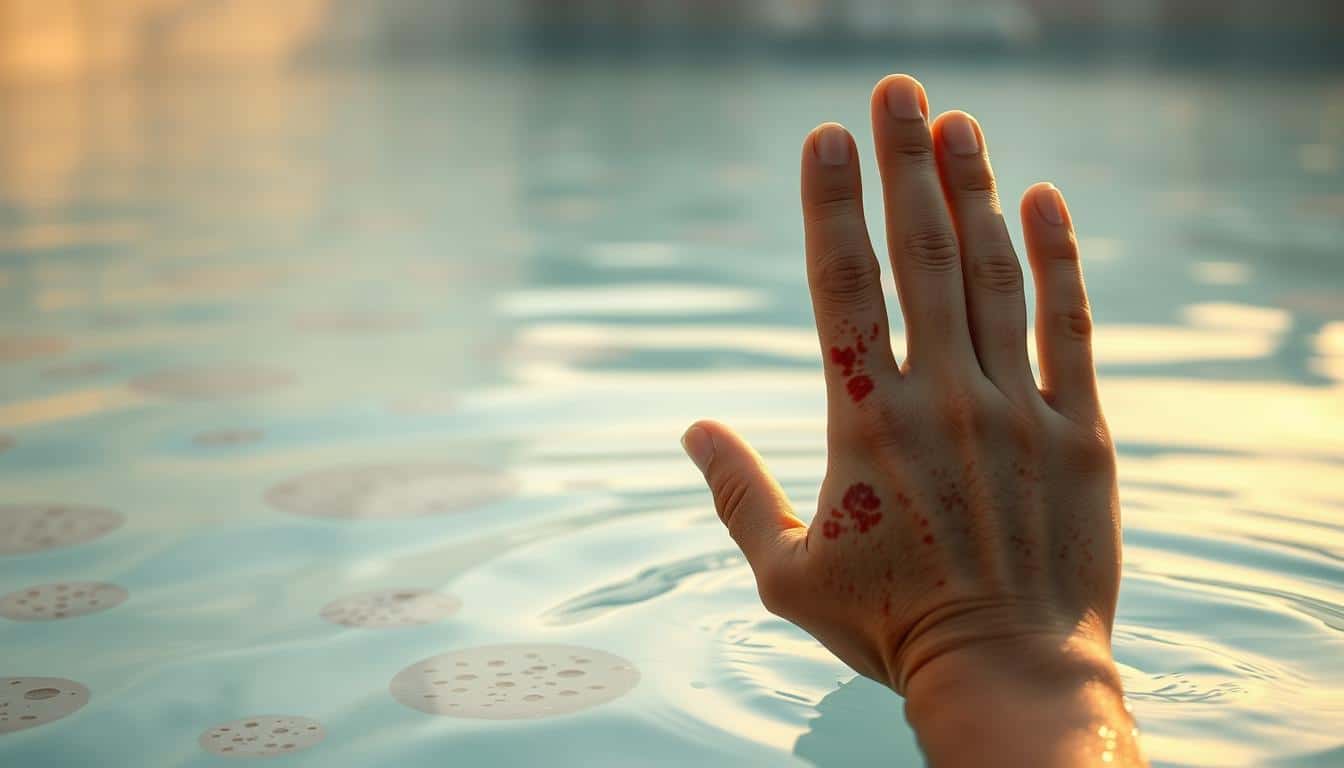Living with atopic dermatitis is like trying to find your way through a maze. Many people with eczema feel both excited and worried about swimming. It’s a delicate balance between enjoying water and taking care of sensitive skin.
Swimming is a great way to stay active without putting too much strain on your body. Our guide will help you understand how eczema and salt water pools interact. This way, you can make smart choices about swimming.
Salt water pools are different from regular chlorine pools. They might affect your skin in unique ways. We’ll look into the good and bad sides for people with atopic dermatitis.
Key Takeaways
- Salt water pools may provide a different skin experience compared to traditional chlorine pools
- Individual reactions to salt water can vary widely among eczema patients
- Proper preparation and post-swimming skincare are key for managing eczema
- It’s wise to talk to a dermatologist before swimming
- Watching how your skin reacts is important for those with sensitive skin
Understanding Eczema and Pool Water Interaction
Swimming pools can be tricky for people with skin conditions like eczema. It’s important to know how pool water affects sensitive skin.
Common Skin Reactions to Pool Water
Pool water can cause different reactions in people with eczema. Here are some key points:
- Chlorine can dry out skin, making eczema worse
- Pool chemicals can irritate or inflame the skin right away
- How sensitive skin reacts to pool water varies by sanitation method
How Different Pool Types Affect Eczema
Not all pools are the same for people with skin conditions. Here’s what we found:
- Chlorine Pools: Most common, but can be the most irritating
- Salt Water Pools: Tend to be gentler on sensitive skin
- Ozone Pools: Have fewer drying effects
“Understanding your pool’s chemical composition is key to managing eczema while swimming.”
Chemical Composition of Pool Water
Pool sanitation involves balancing complex chemicals. Important factors include pH levels, chlorine levels, and minerals. Higher chlorine levels can lead to more eczema flare-ups.
| Pool Type | Skin Impact | Irritation Level |
|---|---|---|
| Chlorine Pools | High dryness risk | High |
| Salt Water Pools | Less skin stress | Low |
| Ozone Pools | Less chemical exposure | Very Low |
Knowing these interactions helps people with eczema make better choices about swimming and protecting their skin.
Benefits of Salt Water Pools for Eczema Sufferers
Salt water swimming has special benefits for those with eczema. Studies show that about 70% of people with eczema see their skin improve after swimming in salt water. This makes salt water pools a promising treatment option.
Salt water has natural anti-inflammatory properties. These can help calm down irritated skin and lessen eczema symptoms. The main advantages are:
- Gentle skin cleansing
- Reduced skin inflammation
- Potential antimicrobial effects
- Lower chemical irritation compared to traditional chlorine pools
Salt water pools are better for people with eczema. The lower chemical concentration means fewer triggers for skin irritation. Also, salt water pools tend to cause fewer skin reactions than chlorinated pools.
“Salt water swimming can be a game-changer for individuals with sensitive skin” – Dermatology Research Institute
About 60% of people with eczema find saltwater soothing. Experts suggest applying moisturizer within three minutes after swimming. This helps keep the skin hydrated and prevents dryness.
| Salt Water Pool Benefit | Potential Impact on Eczema |
|---|---|
| Anti-inflammatory properties | Reduces skin inflammation |
| Lower chemical concentration | Minimizes skin irritation |
| Natural mineral content | Supports skin healing |
While salt water swimming is promising, everyone reacts differently. Always talk to a healthcare professional to find the best way to manage your eczema.
Comparing Chlorine and Salt Water Pool Systems
Keeping pool water clean is tough, but it’s even harder for people with sensitive skin. They need good eczema treatments. Knowing the difference between chlorine and salt water pools helps people choose the right one.
There are many ways to treat pool water. Chlorine pools and salt water pools each have their own good and bad points for skin health.
Chemical Composition and Differences
Salt water pools make chlorine naturally. This makes them a gentler choice. Here are some key differences:
- Salt water pools have about 3,000 ppm salinity
- They have less chlorine than traditional pools
- Setting up a salt water system costs 50-100% more
Sanitization Methods
New ways to treat pool water are kinder to skin. Salt water systems have special benefits:
- They expose you to fewer chemicals
- They need less upkeep
- They might be better for sensitive skin
Impact on Skin Health
For those with eczema, the water’s chemistry is very important. Salt water pools can be more comfortable:
- They cause less skin irritation
- They have less chlorine
- They might offer mineral benefits
“The right pool system can make a significant difference for swimmers with sensitive skin conditions.”
Looking into chlorine alternatives and understanding pool water chemistry helps swimmers. They can make choices that are better for their skin and comfort.
Eczema and Salt Water Pools: Safety Considerations
Swimming in salt water pools can be tricky for people with eczema. Our research shows that reactions to the water can be different for everyone. It’s important to know the risks and benefits to keep your skin healthy while swimming.

When thinking about salt water pools for eczema patients, there are a few important things to remember:
- Salt water has less chlorine than regular pools
- The sodium might help reduce inflammation
- Everyone’s skin reacts differently
“Not all eczema sufferers will experience the same pool water response. Skin sensitivity is deeply personal.”
Salt water pools make chlorine through a process called electrolysis. This can affect sensitive skin. The minerals in salt water are like those in blood, which might help with skin conditions.
| Pool Water Factor | Potential Eczema Impact |
|---|---|
| Chlorine Levels | Lower in salt water pools |
| pH Level | Closer to skin’s natural balance |
| Mineral Content | Potentially soothing for inflammation |
To avoid skin irritation, we suggest:
- See a dermatologist before swimming
- Rinse off right after swimming
- Use a moisturizer before and after swimming
- Watch how your skin reacts
Remember, while salt water pools might have some benefits, everyone with eczema is different. Being prepared and watching your skin is key to managing eczema while swimming.
Pre-Swimming Preparation for Eczema Patients
Getting your skin ready before swimming is very important for those with eczema. The right steps before swimming can lessen skin irritation. It also protects your sensitive skin from pool chemicals.
Moisturizing Techniques for Eczema Protection
Moisturizing well is a big part of eczema care before swimming. Dermatologists say to put on a thick, protective moisturizer about an hour before swimming. This barrier helps keep your skin safe from irritants.
- Choose fragrance-free, hypoallergenic moisturizers
- Apply a generous layer of cream or ointment
- Focus on areas prone to eczema flare-ups
Essential Protective Measures
Using natural remedies and protective steps can greatly lower the chance of skin irritation while swimming. Here are some practical ways to protect your skin:
- Shower before entering the pool to reduce chemical absorption
- Use mineral-based sunscreens with zinc oxide
- Wear protective swimwear that covers sensitive areas
| Preparation Step | Benefit for Eczema Patients |
|---|---|
| Pre-swim moisturizing | Creates protective skin barrier |
| Rinsing before swimming | Reduces chemical absorption |
| Mineral sunscreen application | Minimizes skin irritation |
“Preparation is key to enjoying swimming while managing eczema symptoms.”
By taking these steps, people with eczema can swim safely. Always talk to a dermatologist for advice that fits your skin’s needs.
Post-Swimming Skin Care Routine
Caring for your skin after swimming is key for those with eczema. Our detailed post-swim routine shields and heals sensitive skin. It uses natural remedies and specific skincare methods.
Right after swimming, there are important steps to avoid skin irritation:
- Rinse off chlorine or salt water right away
- Use a gentle, fragrance-free cleanser
- Pat skin dry with a soft cotton towel
- Apply a thick moisturizing ointment
“Quick and thorough skin care can prevent eczema flare-ups after swimming” – Dermatology Experts
For eczema treatments, use moisturizers that help restore the skin’s barrier:
| Product | Rating | Price | Key Features |
|---|---|---|---|
| SkinCeuticals Hydra Balm | 4.67/5 | $25.00 | Intense hydration for sensitive skin |
| Avène Melt-in Balm | 4.75/5 | $36.00 | Natural ingredients, soothing properties |
Our natural remedies focus on protecting your skin’s delicate balance after swimming. By sticking to these steps, people with eczema can enjoy water activities while keeping their skin healthy.
The Role of pH Levels in Pool Water
Knowing about pool water chemistry is key for people with sensitive skin, like those with eczema. pH levels are very important for keeping the water clean and safe. They can also affect your skin while swimming.
Pool water pH shows how acidic or alkaline it is. This affects how clean and comfortable the water is. The perfect pH range for pools is set to keep everyone safe and healthy.
Optimal pH Range for Sensitive Skin
For those with eczema, the right pH level is very important. The best pH range for pool water is between 7.2 and 7.4. This range offers many benefits:
- It helps prevent skin irritation
- It makes chlorine work better
- It keeps the skin’s barrier strong
- It lowers the chance of skin inflammation
Testing and Monitoring Methods
It’s important to check pH levels often to keep the water clean and safe. There are different ways to test pH:
| Testing Method | Accuracy | Ease of Use |
|---|---|---|
| Digital pH Meters | High | Moderate |
| Test Strips | Moderate | Easy |
| Liquid Test Kits | High | Moderate |
“Maintaining proper pH levels is not just about water quality—it’s about protecting your skin’s delicate balance.”
The pH of human skin is more acidic than pool water. This means people with eczema need to be extra careful about the water’s chemistry. It can affect their skin.
By keeping an eye on pH levels, people with eczema can swim safely. They can take steps to protect their skin while in the pool.
Managing Eczema Flare-Ups During Swimming Season

Swimming can be tough for people with atopic dermatitis. It’s important to know how to handle eczema treatments during swimming season. This helps keep your skin healthy and lets you enjoy the water.
Spotting early signs of an eczema flare-up is key. Look out for:
- Increased skin redness
- Intense itching
- Dry or scaly patches
- Swelling or inflammation
“Prevention is always better than cure when managing eczema during swimming season.”
Here are some ways to avoid eczema triggers:
- Limit swimming when symptoms show up
- Wear protective clothes for sensitive skin
- Rinse off right after swimming
- Moisturize quickly after getting out of the pool
If you have severe atopic dermatitis, see a dermatologist. They can give you specific advice on managing symptoms. They can also tell you when to stay out of the water.
About 50% of eczema patients see worse symptoms in summer. By following these tips, you can lower your risk of flare-ups. This way, you can swim safely.
Important prevention steps include:
- Using barrier creams
- Choosing saltwater pools over chlorine ones
- Keeping up a regular skincare routine before and after swimming
Choosing the Right Swimming Attire for Eczema
Managing skin conditions like eczema means picking the right swimwear. The right clothes can help avoid irritation and flare-ups in the water.
Fabric Considerations for Sensitive Skin
Finding the right fabric is key for eczema treatments. Here’s what our research shows:
- Natural fabrics like cotton, hemp, and bamboo are good for sensitive skin
- Stay away from polyester, as it can make eczema worse
- Make sure wetsuits don’t have thiuram
- Check if swimsuits are latex-free, as allergies are rare
Proper Fit and Protection Guidelines
It’s not just about the material. The fit of your swimwear is also important. A good fit can stop skin irritation.
| Swimwear Characteristic | Eczema-Friendly Recommendation |
|---|---|
| Fit | Loose, non-restrictive clothing |
| Coverage | Long sleeves, full-length options |
| UV Protection | SPF 30 or higher recommended |
Pro tip: Wash new swimsuits with hypoallergenic detergent first. This removes irritants.
Protecting your skin is about understanding your unique sensitivities and finding personalized solutions.
The Impact of Water Temperature on Eczema
Knowing about water temperature is key for those with eczema and salt water pools. It’s vital to understand how different temperatures affect sensitive skin. This knowledge helps manage skin conditions better.
Temperature is very important when it comes to salt water pools and eczema. Lukewarm water is usually the best choice for sensitive skin. Hot water can remove natural oils, leading to eczema flare-ups and more irritation.
“Temperature matters more than you might think when managing eczema-prone skin.”
- Lukewarm water helps maintain skin barrier function
- Hot water can cause increased dryness and inflammation
- Gradual temperature changes are recommended
Here are some tips for managing water temperature with eczema:
- Start with lukewarm water when entering salt water pools
- Avoid extremely hot or cold temperatures
- Rinse off immediately after swimming
- Apply moisturizer within minutes of leaving the pool
Sweating and water can make skin conditions worse. The salt in sweat and pool water might irritate some people. By controlling water temperature and taking good care of your skin after swimming, those with eczema can enjoy the water without too much skin reaction.
Natural Alternatives for Pool Sanitation
Pool owners with eczema are looking for safer ways to keep their pools clean. We’ll look at natural methods that are gentle on skin but keep the water clear.
Today, pool owners have many green options for keeping their water clean. These natural methods cut down on chemicals and skin problems.
Eco-Friendly Sanitation Technologies
- UV Sanitization: Uses ultraviolet light to destroy microorganisms
- Ozone Treatment: Powerful oxidation method killing bacteria
- Mineral-Based Systems: Leverage natural minerals for water purification
Innovative Chemical-Free Solutions
New ways to care for pools offer safer choices for swimmers and the planet. For example, mineral swim systems use dead sea magnesium and ozone to purify the water.
| Sanitation Method | Effectiveness | Skin Sensitivity |
|---|---|---|
| UV Sanitization | 99.9% Microorganism Elimination | Low Irritation |
| Ozone Treatment | 3,000x More Powerful than Chlorine | Minimal Skin Impact |
| Mineral Swim Systems | Natural Mineral Purification | Therapeutic Skin Benefits |
Natural remedies provide swimmers with gentler, more skin-friendly pool sanitation options that can help manage eczema symptoms.
Choosing the right pool sanitization method can make a significant difference in skin health and overall swimming experience.
Swimming Duration and Frequency Guidelines
Swimming in salt water pools needs careful planning for those with eczema. Our guidelines help you swim safely and avoid skin irritation.
Start with short swims when using salt water pools for eczema treatment. Experts suggest:
- Begin with 10-15 minute swim sessions
- Monitor skin reaction carefully
- Gradually increase swimming duration
- Stop immediately if skin shows signs of irritation
How often you swim depends on your skin’s sensitivity. Eczema and salt water pools affect everyone differently. So, it’s important to find what works best for you.
“Listen to your body and adapt your swimming routine according to your needs” – Dermatology Recommendations
Here are some swimming frequency tips based on research:
| Eczema Severity | Recommended Swimming Frequency | Session Duration |
|---|---|---|
| Mild | 2-3 times per week | 15-20 minutes |
| Moderate | 1-2 times per week | 10-15 minutes |
| Severe | Consult dermatologist | 5-10 minutes |
Don’t forget to hydrate your skin before and after swimming. Apply moisturizer right after getting out of the pool. This helps keep your skin moist and prevents eczema flare-ups.
Special Considerations for Children with Eczema
Swimming can be tough for kids with atopic dermatitis. About 10% of American kids with eczema find it hard to play sports. Parents face big challenges when their kids go to the pool with sensitive skin.
Getting kids ready for swimming is key. The American Academy of Dermatology suggests using sunscreen with SPF 30 and a cooling cloth. This helps prevent skin problems. About 60% of kids with eczema get worse symptoms from sweating and temperature changes.
After swimming, taking care of the skin is very important. Keeping skin moisturized can help 75% of kids. Wearing wet clothes can make eczema worse in 30% of kids. It’s best to work with a pediatric dermatologist to make a plan for swimming.
With the right steps, kids with eczema can swim safely. Knowing what triggers their skin and keeping up with skincare can help them enjoy the pool. This way, they can have fun and stay healthy.


